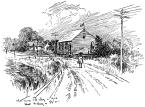From the Vineyard Gazette edition of May 1948:
Martha’s Vineyard, virtually free of billboards and signs for many years, can breathe freely again, since the eagle eye of the Martha’s Vineyard Garden Club, noting encroachments upon the obstructed state of their Island domain, transferred its reproachful gaze to the companies responsible for the erection of new signs in the past year or two. The garden club has conducted an aggressive and successful campaign against roadside signs since its founding.
Through the diligence of the club, as represented by Mrs. Benjamin C. Mayhew, the cooperation of dealers and companies has been obtained, so that Coca-Cola signs erected in West Tisbury and Chilmark are already down while the great sign of the Nemasket Bottling Co., close to the steamboat landing in Oak Bluffs, is to come down within a week.
Mrs. Mayhew wrote to the director of public relations of the Coca-Cola company in January, as follows:
“For over twenty years, it has been the boast of Martha’s Vineyard that the Island has been kept free from billboards. This has been made possible by the hearty cooperation of the local tradespeople and the nationwide organizations which many of them represent, with the Martha’s Vineyard Garden Club which has been the motivating force behind the restriction of unsightly outdoor advertising.
“This summer, therefore, the garden club and many non-member residents, both seasonal and year-round, were shocked by the appearance of a large sign advertising your products, erected in a rural district next to a roadside cafe, and more recently by a similar one tacked up on a fence outside a country grocery store. Your local agent, Mr. Marshall McDonough, was approached by one of the garden club officers, and he explained that he personally could not refuse any size or type of sign to his customers . . .
“When the garden club first embarked on its campaign to rid the Vineyard of billboard advertising in the early thirties, it was forced to use the boycott method of ‘we refuse to patronize those who advertise.’ Since we have an active membership of 325 men and women, it worked quickly and effectively. However, before invoking this plan again, we preferred to write directly to you to invite your cooperation by: 1. Not furnishing your local distributor with large outdoor or billboard-type advertising of your product. 2. Requesting him to withdraw those already issued.
“We feel sure that the favorable publicity your firm and product would receive by such voluntary action would up your local sales far more than extensive outdoor advertising, which has for so long been against Vineyard business policy backed by public opinion . . .”
Replies came from the public relations and advertising departments of the company in February and March, stating that Marshall McDonough, Island agent for product, had been asked to get in touch with Mrs. Mayhew “in an effort to settle the matter to the mutual satisfaction of all concerned . . .”
Mr. McDonough promptly wrote that: “I am very sorry that this sign was the cause of any criticism by any person or group, and I had no intention of blemishing the Island’s scenery or antagonizing anyone when I erected it.”
He added that the sign at the Chilmark Tavern was down and would not be put up again and that he would see to having the one at the S.M. Mayhew store removed. Mr. McDonough asked that if any of the company’s signs seemed to offend, he be informed so that the matter could be “agreeably settled.” The garden club replied that it was pleased with his cooperative attitude, asking that in future signs should be reduced to “an irreducible minimum” and “erected as far as possible within the already established commercials areas.” At the same time that she wrote to the Coca-Cola company, Mrs. Mayhew also wrote in the same vein to the president of the Nemasket company, saying, in part, that the garden club was “distressed and shocked by the large billboard your company erected on the south side of your Oak Bluffs warehouse.”
“It is our desire to respect the people of this community,” the manager replied.
•
Invited to attend the Joint Conference on Roadside Improvement in Newark, N.J. to tell what methods the Vineyard had used to rid itself of billboards, Mrs. Benjamin C. Mayhew of Chilmark, publicity chairman of the Martha’s Vineyard Garden Club, came home the middle of the week, and reported that the conference was distinctly worth attending.
It was sponsored by the American Planning and Civic Association, American Nature Association, conservation committee of the Garden Club of America, National Council of State Garden Clubs, and National Roadside Council. It was the first conference to be held by the group since before the war.
Mrs. Mayhew spoke during the symposium which followed the discussion period on Highlights in the News About Roadsides, and said she was pleasantly received and greatly enjoyed the day-long conference. She was away from the Island for ten days.
Compiled by Alison Mead






Comments (1)
Comments
Comment policy »